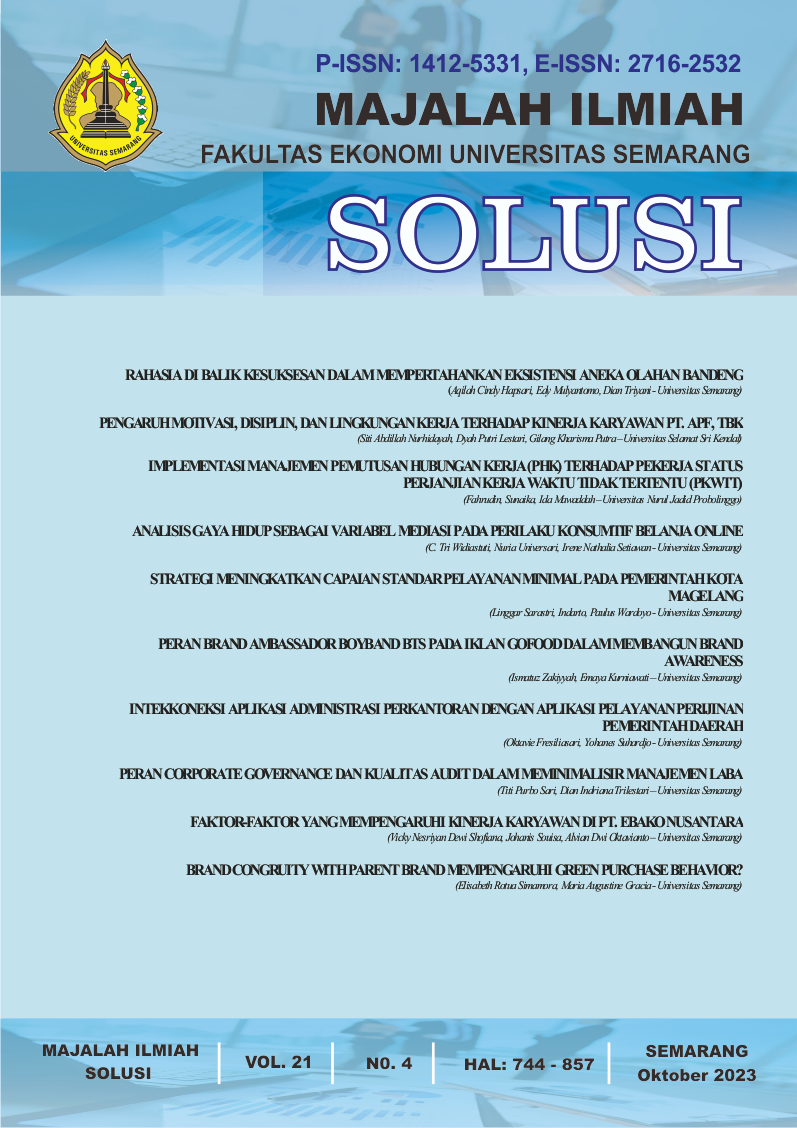BRAND CONGRUITY WITH PARENT BRAND MEMPENGARUHI GREEN PURCHASE BEHAVIOR?
DOI:
https://doi.org/10.26623/slsi.v21i4.7961Keywords:
Attitude Toward Parent Brand, Self Brand Congruity, Green Brand Perceived Value, Attitude Toward, Green Brand Extension, Green Brand Purchase Behavior.Abstract
This research aims to analyze the factors that influence the perceived value of environmentally friendly products on purchasing behavior for environmentally friendly brand products. The aim of this research is to build a comprehensive model and test the relationship between attitudes towards parent brand and self-brand congruity. Attitude toward green brand extension is used to mediate the relationship between the two constructs, namely the green brand perceived value and green brand purchase behavior. Respondents in this research were users of environmentally friendly fashion, namely Levi's products, The Body Shop in Semarang. The sampling technique used was purposive sampling technique. The questionnaire distributed in this research was 444 respondents. Only 400 questionnaires could ultimately be used in this research. The data analysis technique in this research uses PLS-SEM with WarpPLS version 7.0. The research results show that: (1) attitudes towards the parent brand and self-brand congruity have a positive effect on the green brand perceived value (2) green brand perceived value has a positive effect on attitudes towards green brand extension and (3) attitudes towards green brand extension have a positive effect on green brand purchase behavior.
References
Aaker, D. A., & Keller, K. L. (1990). Consumer evaluations of brand extensions. Journal Of Marketing, 54(1), 27-41.
Baek, J., & Lee, J. (2021). A Conceptual Framework on Reconceptualizing Customer Share of Wallet (SOW): As a Perspective of Dynamic Process in the Hospitality Consumption Context. Sustainability, 13(3), 1423.
Bottomley, P. A., & Holden, S. J. (2001). Do we really know how consumers evaluate brand extensions? Empirical generalizations based on secondary analysis of eight studies. Journal of Marketing Research, 38(4), 494-500.
Cheng‐Hsui Chen, A., & Chen, S. K. (2000). Brand dilution effect of extension failure–a Taiwan study. Journal of product brand management, 9(4), 243-254.
DUBOIS, B., CZELLAR, S., & LAURENT, G. (2005). Consumer Segments Based on Attitudes Toward Luxury: Empirical Evidence from Twenty Countries. Marketing Letters, 16(2), 14.
Hosany, S., & Martin, D. (2012). Self-image congruence in consumer behavior. Journal of Business Research, 65(5), 685-691.
Johar, G. V., Sengupta, J., & Aaker, J. L. (2005). Two Roads to Updating Brand Personality Impressions: Trait versus Evaluative Inferencing. Journal of Marketing Research, 42((4),), 458-469. doi:https://doi.org/10.1509/jmkr.2005.42.4.458
Kalafatis, S. P., Pollard, M., East, R., & Tsogas, M. H. (1999). Green marketing and Ajzen’s theory of planned behaviour: a cross‐market examination. Journal of Consumer Marketing, 16(5), 441-460. doi:10.1108/07363769910289550
Landon Jr, E. L. (1974). Self concept, ideal self concept, and consumer purchase intentions. JOURNAL OF CONSUMER RESEARCH, 1(2), 44-51.
Laroche, M. (2002). Selected issues in modeling consumer brand choice: the extended competitive vulnerability model. In Essays by distinguished marketing scholars of the Society for Marketing Advances (pp. 69-114): Emerald Group Publishing Limited.
M. Joseph Sirgy, J. S. J., A. C. Samli, C. B. Claiborne. (1991). Self-Congruity Versus Functional Congruity: Predictors of Consumer Behavior. Journal of the Academy of Marketing Science, Volume 19(Number 4), pages 363-375. doi:https://doi.org/10.1007/BF02726512
Sirgy, M. J. (1982). Self-concept in consumer behavior: A critical review. JOURNAL OF CONSUMER RESEARCH, 9(3), 287-300.
Sirgy, M. J. (1982). Self-Concept in Consumer Behavior: A Critical Review. JOURNAL OF CONSUMER RESEARCH, Vol. 9.
Woo, E., & Kim, Y. G. (2019). Consumer attitudes and buying behavior for green food products: From the aspect of green perceived value (GPV). British Food Journal, 121(2), 320-332.
Downloads
Published
Issue
Section
License
The author who will publish the manuscript at Solusi : Journal of Solusi, agree to the following terms:
|













 This work is licensed under a
This work is licensed under a 